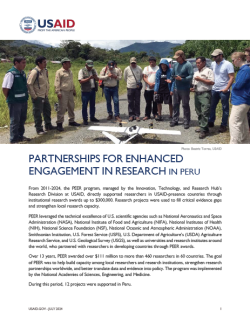The Partnerships for Enhanced Engagement in Research (PEER) is an international program that funds researchers in developing countries who partner with U.S. government-funded researchers to address
global development challenges.
The PEER program is supported by the U.S. Global Development Lab at USAID. It directly supports researchers in USAID-presence countries through institutional research awards up to $200,000. Research projects are used to fill critical evidence gaps or use implementation research to test how best to locally scale processes that result in improved development programming or can inform local and international policies.
PEER leverages the technical excellence of U.S. scientific agencies such as National Aeronautics and Space Administration (NASA), National Institute of Food and Agriculture (NIFA), National Institutes of Health (NIH), National Science Foundation (NSF), National Oceanic and Atmospheric Administration (NOAA), Smithsonian Institution, U.S. Forest Service (USFS), U.S. Department of Agriculture’s (USDA) Agriculture Research Service, and U.S. Geological Survey (USGS), as well as universities and research institutes around the world, who have partnered with researchers in developing countries through PEER awards.
Since its launch in 2011, PEER has awarded nearly $100 million to more than 350 projects in 50 countries. The goal of PEER is to help build capacity among local researchers and research institutions, strengthen research partnerships worldwide, and better translate data and evidence into policy. The program is implemented by the National Academies of Sciences, Engineering, and Medicine.
ACTIVITIES IN PERU
PI: Sandra Ríos-Cáceres, Instituto del Bien Común, with co-PI Aoife Bennett
U.S. Partner: Hinsby Cadillo-Quiroz, Arizona State University (funded by the National Science Foundation); and Victor Gutiérrez-Vélez, Temple University
Improving sustainability and resilience of peruvian amazon systems through silvopastoralism
PI: Carlos Gomez, Universidad Nacional Agraria La Molina
U.S. Partner: Heathcliffe Riday, U.S. Dairy Forage Research Center, U.S. Department of Agriculture – Agricultural Research Service
PI: Johny Cesar Ponce, Universidad Peruana Cayetano Heredia & the Center for Research in Environmental Health (CREEH Perú)
U.S. Partner: Alexander van Geen, Lamont-Doherty Earth Observatory of Columbia University
Led by the National Agrarian University La Molina, PERU-Hub is developing an agricultural technology transfer system for the Amazon region. The goal of the research and innovation center is to explore viable crops for farmers in the northern San Martin region of Peru to adopt with confidence, strengthening their livelihoods. PERU-Hub will serve as a model for the transfer and use of advanced technologies.

